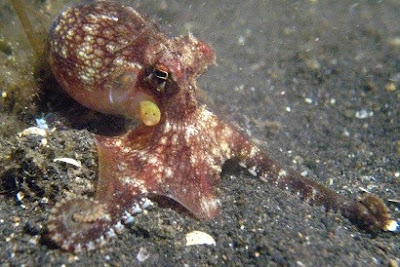 |
| Kasawari Lembeh Dive Resort |
If you read my first post, When Octopus Attack, you already know that these posts aren't about octopus attacks, but more about the natural behavior of underwater creatures.
A few years ago, my husband and I were fortunate enough to travel to Indonesia for a few weeks of scuba diving. We spent the first half of our trip diving from the SMY Ondina in the waters of Raja Ampat. For the second half of the trip, we traveled to North Sulawesi, and spent the remainder of the trip diving with the guides of the Kasawari Lembeh Dive Resort. We were told that we would be "muck diving," which doesn't sound like very much fun to most people, but to Pacific Northwest divers, we spend most of our time muck diving, so we were excited!
Lembeh Strait is home to some of the worlds most amazing underwater critters. With the right guide, or a good eye, you'll find pygmy seahorses, wunderpus, stargazers, all kinds of frogfish including the hairy frogfish, flamboyant cuttlefish, angler fish, spiny devil, schools of file fish, and so much more.
One of the cutest creatures we found was this feisty octopus. They usually bury themselves below the sand, leaving their eyes just above the sand so they can observe the world around them. We spotted this small coconut octopus on our own as it was carrying this clam shell around, and he entertained us for around 15 minutes as we enjoyed an extra long safety stop.
This octopus was around the size of a small lime, but it packed a huge attitude. When it noticed us, the octopus logged itself inside the shell and pulled it closed around itself, peaking out to check on us once in awhile.
Realizing we weren't going to go away, the octopus dropped the shell and put on a beautiful show hiding under the sand, blowing sand at us, going through several color changes, and hiding in plain sight by blending in with whatever drifted by. Eventually, we waved goodbye to this spunky little octopus and made our way to the surface. We will never forget this adorable little octopus.
If you are fortunate enough to spot sea life in their natural habitat, please remember that their behavior is usually meant to scare you so that you won't bother them. Although they are harmless, respect them and enjoy them with your eyes or your camera, not your hands. They will live a little longer, and future divers will have an opportunity to enjoy them as well.
A few years ago, my husband and I were fortunate enough to travel to Indonesia for a few weeks of scuba diving. We spent the first half of our trip diving from the SMY Ondina in the waters of Raja Ampat. For the second half of the trip, we traveled to North Sulawesi, and spent the remainder of the trip diving with the guides of the Kasawari Lembeh Dive Resort. We were told that we would be "muck diving," which doesn't sound like very much fun to most people, but to Pacific Northwest divers, we spend most of our time muck diving, so we were excited!
Lembeh Strait is home to some of the worlds most amazing underwater critters. With the right guide, or a good eye, you'll find pygmy seahorses, wunderpus, stargazers, all kinds of frogfish including the hairy frogfish, flamboyant cuttlefish, angler fish, spiny devil, schools of file fish, and so much more.
 Coconut Octopus |
This octopus was around the size of a small lime, but it packed a huge attitude. When it noticed us, the octopus logged itself inside the shell and pulled it closed around itself, peaking out to check on us once in awhile.
Realizing we weren't going to go away, the octopus dropped the shell and put on a beautiful show hiding under the sand, blowing sand at us, going through several color changes, and hiding in plain sight by blending in with whatever drifted by. Eventually, we waved goodbye to this spunky little octopus and made our way to the surface. We will never forget this adorable little octopus.
If you are fortunate enough to spot sea life in their natural habitat, please remember that their behavior is usually meant to scare you so that you won't bother them. Although they are harmless, respect them and enjoy them with your eyes or your camera, not your hands. They will live a little longer, and future divers will have an opportunity to enjoy them as well.
 Coconut Octopus |
 Coconut Octopus |